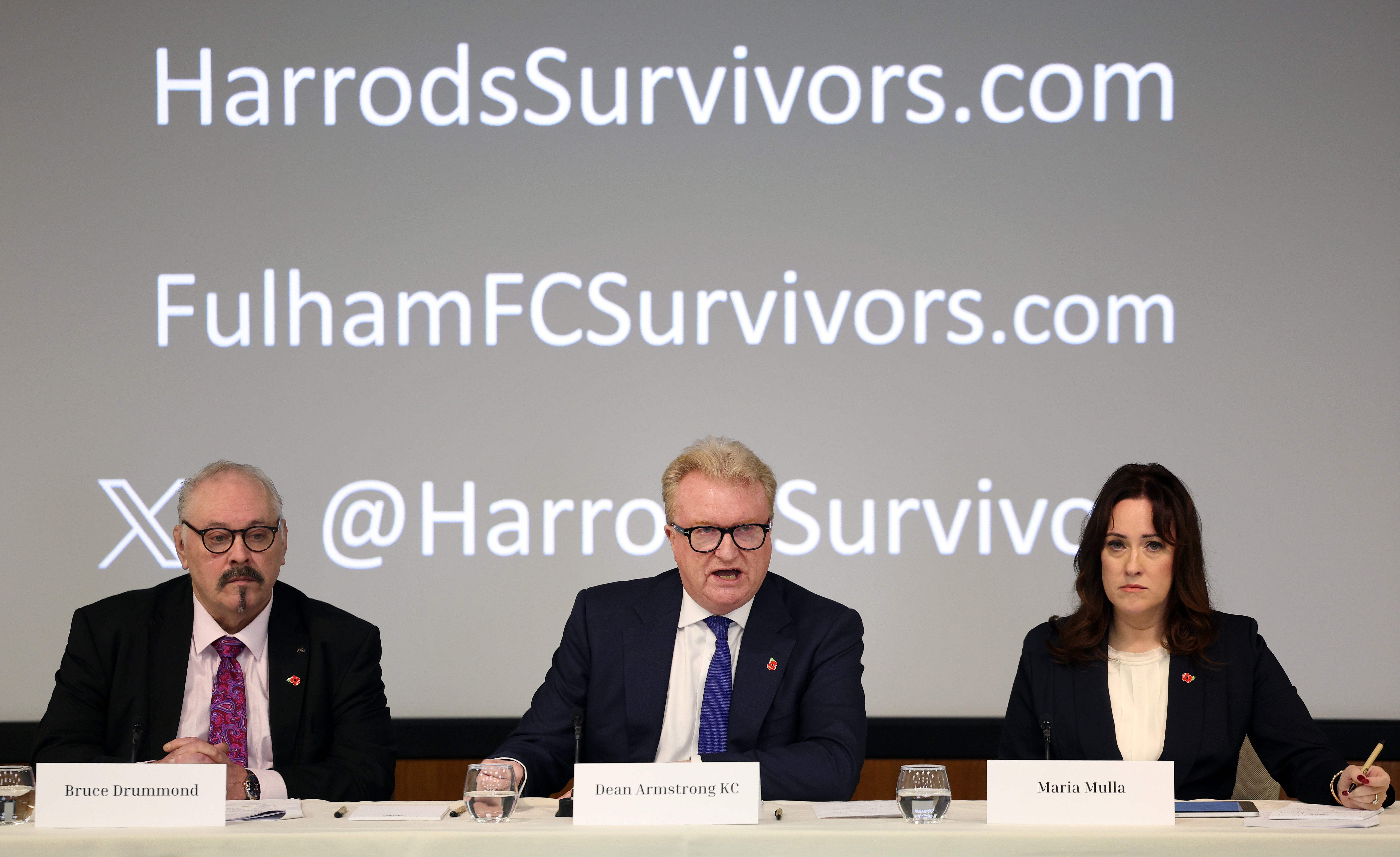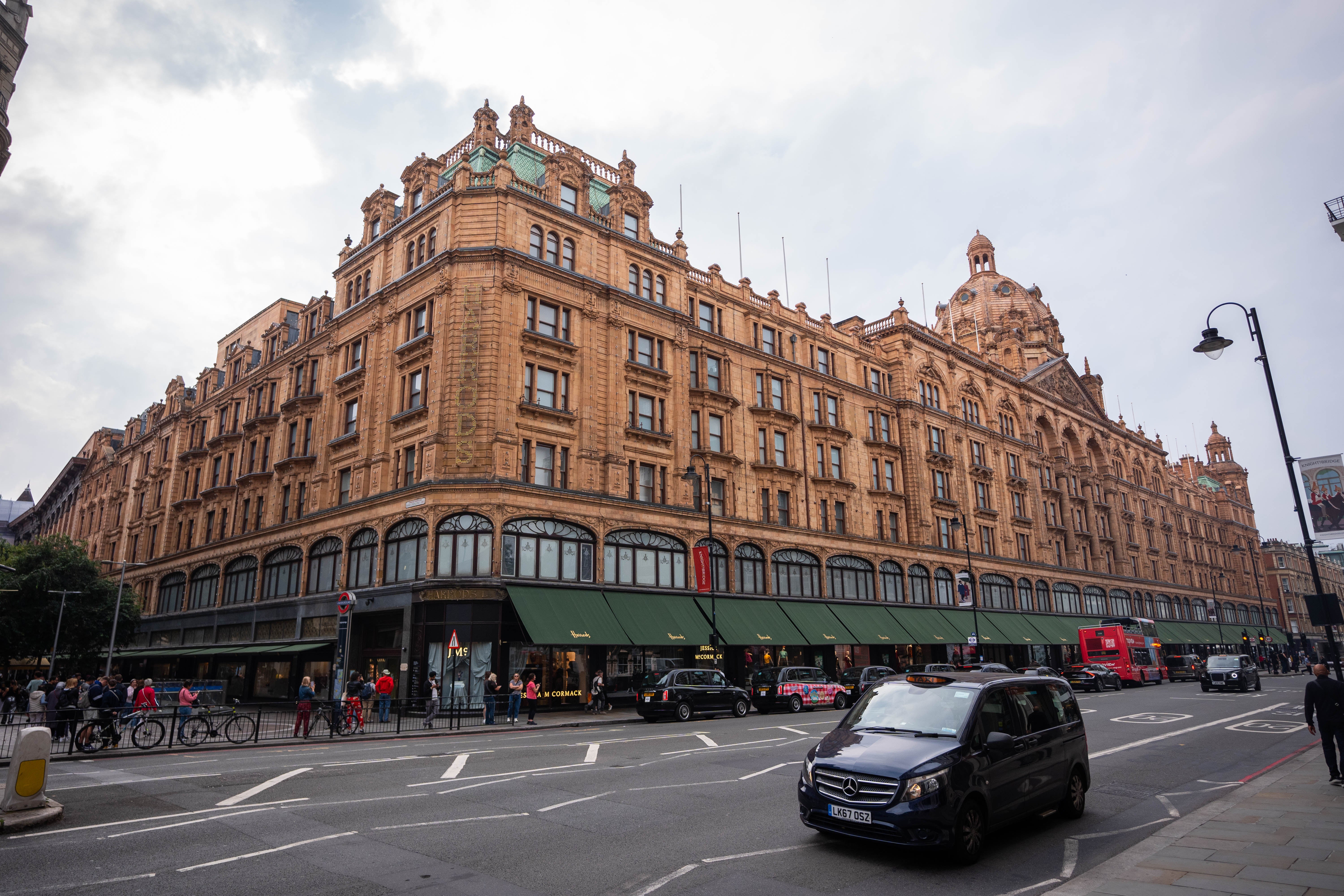
More than 420 people have contacted lawyers investigating alleged sexual abuse by Mohamed al-Fayed, they have revealed, as they warned anyone seeking to avoid liability: “We are coming for you”.
Fayed, who died last year aged 94, was accused by more than 20 women of sexual assault in a BBC documentary which aired last month, including five women who said they were raped by the late Harrods and Fulham FC owner. That abuse is alleged to have taken place in London, Paris, St Tropez and Abu Dhabi.
Since the documentary Al Fayed: Predator At Harrods aired, more than 250 individuals are “now in the Harrods process to settle claims directly with the business”, the department store said last week. However, the Financial Times reported that four alleged victims had quit the compensation scheme, citing concerns over potential conflicts of interest and poor communication.
At a press conference on Thursday, barrister Dean Armstrong KC said: “This is no longer only about survivors from Harrods. We now have clients who have suffered abuse at Harrods, at Fulham Football Club, at the hands of al-Fayed, and at various places associated with al-Fayed.
“Our survivors have been let down by significant parts of our society, and the threats to them and obstacles placed in front of us as we seek to navigate the path to justice for them has not dimmed – in fact it’s enhanced – our resolve,” he added.

Announcing that their team – Justice for Harrods Survivors – has partnered with a major law firm with the backing of £1bn, Mr Armstrong said they had sent their first letter of claim to Harrods on Thursday.
“That is the beginning of the formal legal process. [For] anyone who thinks that it’s one [letter] – it’ll be followed today by another. It’ll be followed the day after by others. And it’ll be followed by hundreds more. If our survivors are pushed into having to defend themselves in order to achieve justice, we are ready, we are resourced, and we are determined.
“It is time for Harrods, time for the Fayed estate, and time for Fulham Football Club, amongst other sporting institutions potentially, to understand that now is the time to do the right thing,” he said.
Noting that more than 20 witnesses have come forward “to support the layers and layers of abuse that we have uncovered”, he added: “Anybody listening to this who thinks that our survivors are lone voices – you’re wrong.

“Our challenge to anyone who seeks to avoid proper liability is that we are coming for you.”
Lawyer Bruce Drummond said the team had received enquiries from “over 421 people”. While the majority are from the UK, 12 women are from America and six from Australia, with others from the United Arab Emirates, Denmark, Spain, Thailand, New Zealand, Italy, Romania and Malaysia.
“That, in our opinion, is an industrial scale of abuse. Abuse that could only have been perpetrated with a system that enabled that abuse to happen,” said Mr Drummond, adding that “this system was in place for many, many years”.
Fayed acquired Harrods for £615m in 1985. In 2010, after 26 years in charge, he sold the department store to the Qatari royal family for a reported £1.5bn.
Harrods’ current owners have said they are “utterly appalled” by the allegations and are carrying out an internal review into whether current staff were involved in the allegations, “directly or indirectly”.
They previously said in a statement: “These were the actions of an individual who was intent on abusing his power wherever he operated and we condemn them in the strongest terms. We also acknowledge that during this time as a business we failed our employees who were his victims and for this we sincerely apologise.
“The Harrods of today is a very different organisation to the one owned and controlled by al-Fayed between 1985 and 2010; it is one that seeks to put the welfare of our employees at the heart of everything we do.”
Speaking on Thursday, Mr Drummond said the team now also has credible evidence of abuse by Fayed at Fulham FC, Park Lane residencies, his estate in Surrey, his aircraft, the Ritz Hotel in Paris, Villa Windsor in France, and on his yacht in Saint-Tropez.
Citing his colleague, barrister Maria Mulla, Mr Drummond added: “Everywhere Fayed went, abuse followed. Whether you’re an ambassador’s daughter, the daughter of a famous footballer, a footballer, or a complete unknown starting their first job in a strange city, it appears that every young lady in his orbit was a target.”
Detailing a “network of abuse” at Harrods, he alleged that there “is clear evidence of a team of enablers who supported Fayed”, adding: “We expect these enablers will eventually be named by the press and face further consequences.”
Questioned on how many “enablers” of Fayed’s alleged abuse had been identified by the group, Ms Mulla said: “It was a very large web. Some of them are still alive – it’s not in our ability to name names or announce who those individuals are.”
Allegations of sexual abuse by Fayed were previously reported, including by Vanity Fair in 1995, ITV in 1997 and Channel 4 in 2017. But lawyers say many women only felt safe or able to speak publicly in the BBC documentary after Fayed died last year.
A total of 21 women also came forward to the Metropolitan Police prior to the BBC documentary, and evidence in two of these cases was shown to the Crown Prosecution Service, in 2009 and 2015. But it decided not to go ahead with either because there was not “a realistic prospect of conviction”.
Former inspector of constabulary Zoe Billingham previously told the BBC: “It beggars belief that 21 women came forward to the Met with presumably very similar allegations about a wealthy man in a position of extreme power and authority and yet nothing happened, again. There should have been a full investigation.”
Fulham FC has previously said it absolutely condemns abuse in all forms, adding: “We remain in the process of establishing whether anyone at the club is or would have been impacted by Mohamed al-Fayed in any manner as described in recent reports.”







